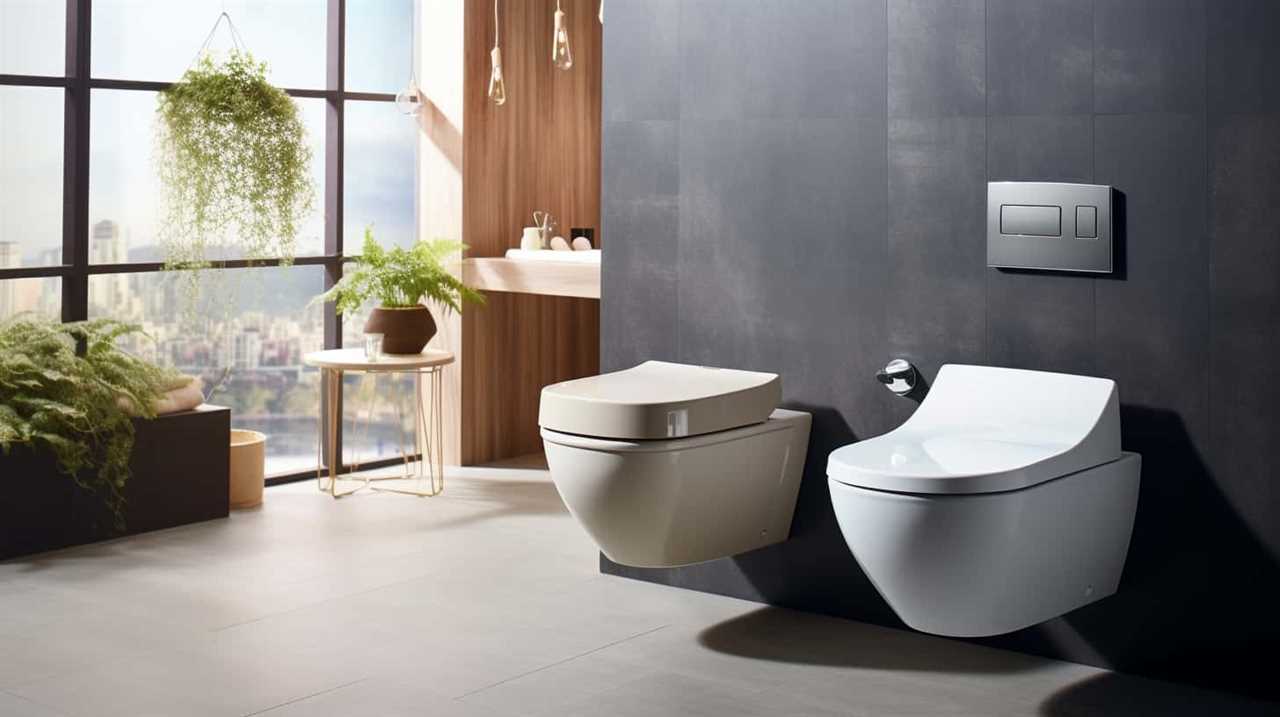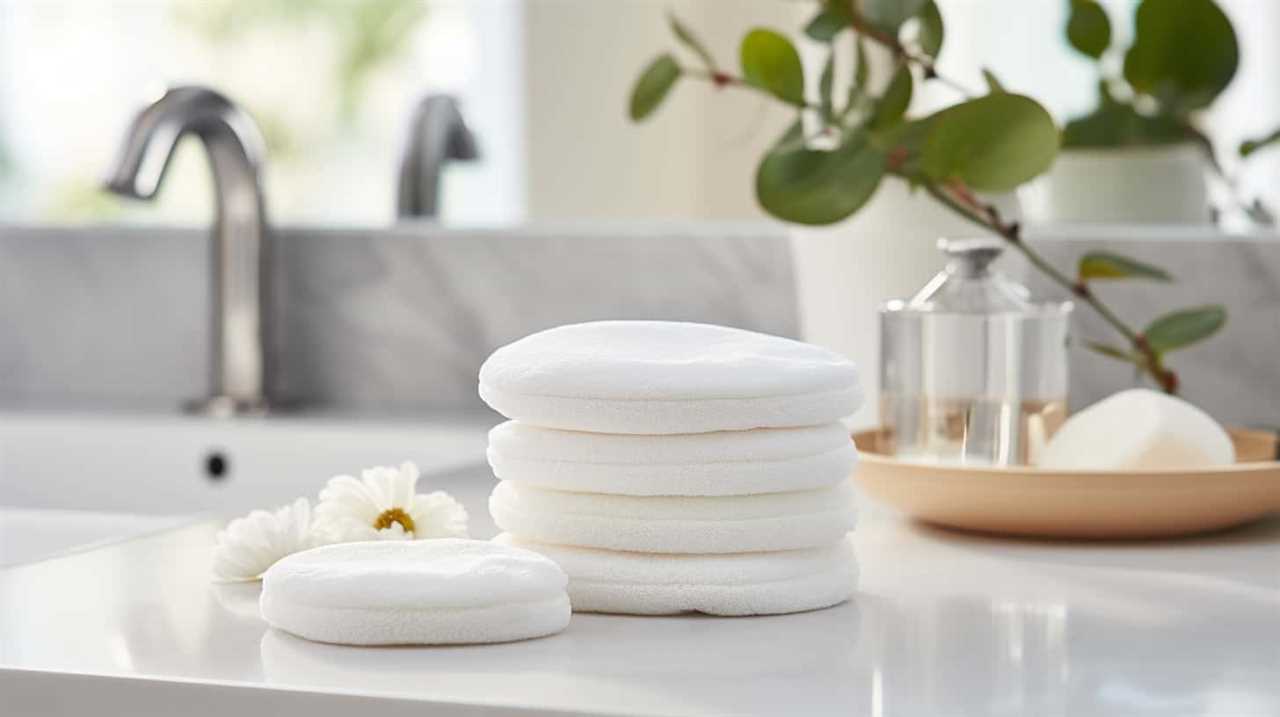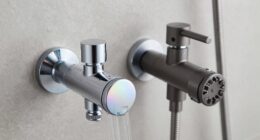Have you ever entered your bathroom only to be met with a strong odor that smells like sewage? It’s a common situation that can be very unpleasant.
In this article, we’ll explore the common causes behind this unpleasant odor, from faulty plumbing and sewer systems to dried out P-traps and drain traps.
We’ll also discuss blocked or ventilation issues, as well as the growth of mold and mildew in the bathroom.
Get ready to master the art of eliminating bathroom odors!

Key Takeaways
- Blocked or backed-up sewer line and sewer gas leaks are common causes of sewage smell in the bathroom.
- Faulty plumbing and sewer systems, including poor maintenance and leaks or blockages in the pipes, can also lead to sewage odors.
- Dried out P-traps and drain traps compromise the barrier against sewage odors and should be regularly maintained to prevent odors from permeating.
- Blocked drains and ventilation issues can cause sewage backups and allow odors to linger, but regular maintenance and improved air circulation can help prevent these issues.
Common Causes of Sewage Smell in Bathroom
One common cause of a sewage smell in the bathroom is due to a blocked or backed-up sewer line. When the sewer line becomes obstructed, it can cause sewer gas leaks, resulting in an unpleasant odor. Sewer gas is a mixture of gases, including hydrogen sulfide, which gives off the characteristic rotten egg smell.
Another possible cause of the smell is septic tank problems. If the septic tank is full or malfunctioning, it can release foul odors into the bathroom. These issues can be resolved by contacting a professional plumber to inspect and clear the sewer line or septic tank.
Moving forward, we’ll now discuss another potential cause of the sewage smell in the bathroom: faulty plumbing and sewer system.
Faulty Plumbing and Sewer System
Now let’s explore how faulty plumbing and a malfunctioning sewer system can contribute to the sewage smell in your bathroom.

Poor plumbing maintenance can result in leaks, blockages, and cracks in the pipes, allowing sewer gas odor to escape into your bathroom. These odors are caused by the decomposition of waste materials, which produce gases like hydrogen sulfide and methane.
Additionally, a malfunctioning sewer system can lead to sewer backups, causing sewage to flow back into your bathroom. This can happen due to clogged sewer lines, damaged sewer pipes, or a faulty sewer pump.
Addressing these issues promptly is crucial to prevent further damage and eliminate the unpleasant smell.
Now, let’s move on to the next section, where we’ll discuss another common cause of bathroom odors: dried out p-traps and drain traps.

Dried Out P-Traps and Drain Traps
To address the issue of bathroom smells like sewage, it’s important to consider the potential cause of dried out p-traps and drain traps.
P-traps and drain traps are integral components of a plumbing system that prevent sewage odors from entering the bathroom. These traps are designed to hold a small amount of water, creating a barrier that blocks the escape of foul smells.
However, if these traps dry out, the barrier is compromised, allowing sewage odors to permeate the bathroom. Fixing a dried out p-trap or drain trap is relatively simple. Just pour water into the trap to refill it and restore the protective barrier.
Preventing sewage odors requires regular maintenance to ensure that the traps remain filled with water and functioning properly.

Blocked or Ventilation Issues
We often encounter blocked drains or ventilation issues that can lead to a sewage-like smell in the bathroom. When the drains are blocked, it restricts the flow of water and can cause sewage to back up into the bathroom. On the other hand, ventilation issues can prevent proper air circulation, allowing unpleasant odors to linger. To address these problems, it is important to implement ventilation solutions and ensure that drains are kept clear. Installing exhaust fans or opening windows can help improve air circulation and eliminate foul smells. Regular maintenance of drains, such as using drain cleaners or calling a professional plumber, can prevent blockages and subsequent odors. It is crucial to address these issues promptly, as the lingering smell can have adverse health effects.
| Blocked Drains | Ventilation Issues |
|---|---|
| Causes sewage to back up | Prevents proper air circulation |
| Restricts water flow | Allows unpleasant odors to linger |
| Requires regular maintenance | Requires installation of exhaust fans or opening windows |
Mold and Mildew Growth in Bathroom
Mold and mildew thrive in bathrooms with poor ventilation and blocked drains, exacerbating the sewage-like smell. These fungi reproduce by releasing spores into the air, which can trigger allergies and respiratory issues in sensitive individuals.
To prevent mold growth, it’s crucial to improve bathroom ventilation by opening windows or using exhaust fans. Regularly cleaning bathroom surfaces with a mixture of bleach and water can also help eliminate mold and mildew. Pay extra attention to areas prone to moisture, such as shower curtains, grout lines, and the underside of bathroom sinks.
Additionally, fixing any leaks and ensuring that drains are clear of blockages will help reduce the conditions that promote mold and mildew growth. Taking these preventive measures won’t only eliminate the unpleasant odor but also create a healthier bathroom environment.

Frequently Asked Questions
How Can I Get Rid of the Sewage Smell in My Bathroom?
To eliminate sewage odor in our bathroom, we need to identify and address the common causes of bathroom smells. By locating and fixing any leaks, cleaning the drains, and ensuring proper ventilation, we can get rid of the unpleasant smell.
Can a Clogged Drain Lead to a Sewage Smell in the Bathroom?
Yes, a clogged drain can lead to a sewage smell in the bathroom. Regular plumbing maintenance is crucial to prevent drain odor. Ensure all drains are clear and free of debris to avoid unpleasant smells.
Does a Sewage Smell in the Bathroom Indicate a Serious Plumbing Issue?
A sewage smell in the bathroom could indicate a potentially serious plumbing issue. It is imperative to identify the causes of bathroom odor and promptly address any signs of underlying plumbing problems to avoid further complications.
Can a Sewage Smell in the Bathroom Be Harmful to My Health?
A sewage smell in the bathroom can pose health risks due to potential exposure to harmful gases and bacteria. Possible causes include a blocked sewer line, dry P-trap, or plumbing issues.

What Are Some Preventive Measures to Avoid Sewage Smell in the Bathroom?
To prevent a sewage smell in the bathroom, we can take preventive measures such as regularly cleaning the drains, using a drain trap, and ensuring proper ventilation. Common causes of the smell include blocked pipes and plumbing issues.
Conclusion
In conclusion, a sewage smell in the bathroom can be caused by various factors such as faulty plumbing, dried out P-traps, blocked ventilation, and mold growth.
It’s important to address these issues promptly to ensure a clean and odor-free bathroom environment. By identifying and fixing the root cause, you can eliminate the unpleasant smell and maintain a fresh and hygienic space.
Don’t let your bathroom become a breeding ground for unwanted odors, take action today!










